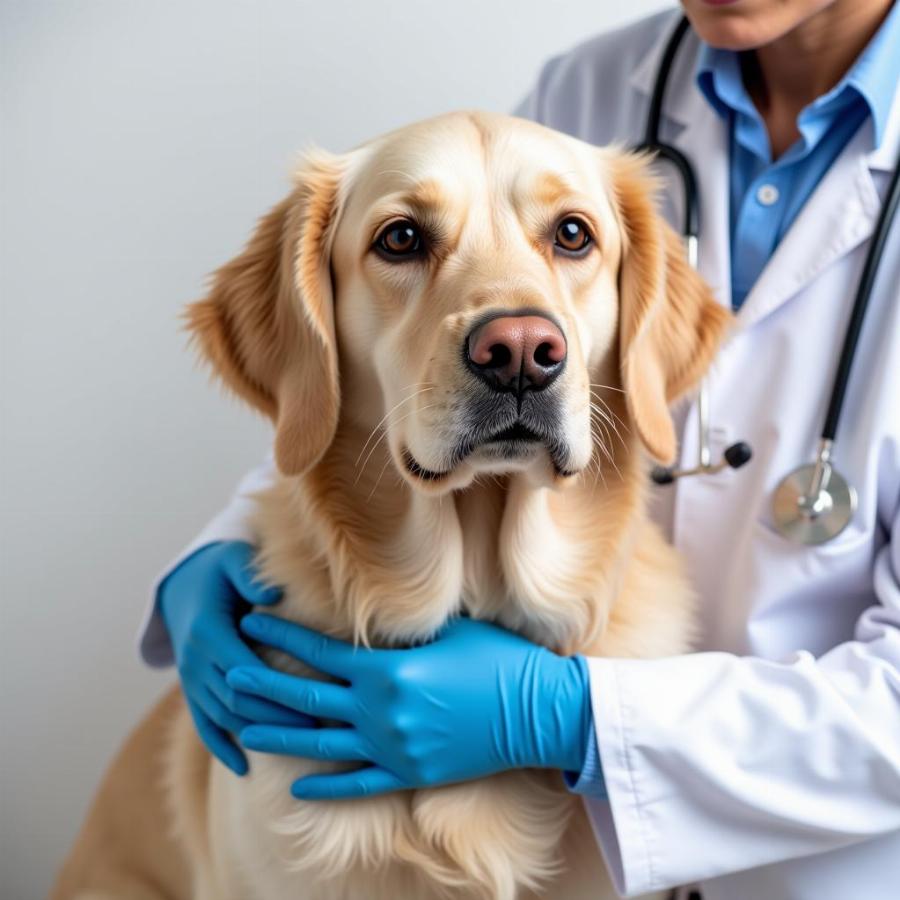After your furry friend undergoes surgery, it’s natural to be concerned about their recovery, and that includes their bathroom habits. It’s not uncommon for a dog not pooping after surgery to cause some worry for pet parents. While some delay is expected, it’s essential to know when it’s a typical part of recovery and when to seek veterinary attention. This article will guide you through the common reasons for post-surgery constipation in dogs, what to expect, and when it’s time to call your vet.
Why is My Dog Not Pooping After Surgery?
Several factors can contribute to constipation in dogs after surgery. Let’s take a look at some of the most common reasons:
- Anesthesia: Anesthesia slows down the digestive system, which is completely normal. It can take a while for your dog’s gut motility (the movement of food through the digestive tract) to return to its regular pace.
- Pain Medication: Many pain medications, particularly opioids, can have the side effect of slowing down the digestive system, leading to constipation.
- Dehydration: It’s not unusual for dogs to be mildly dehydrated after surgery, especially if they’ve had fluid restrictions beforehand. Dehydration can lead to harder stools that are difficult to pass.
- Reduced Activity: If your dog is recovering from surgery and less active than usual, their bowel movements may decrease.
- Diet Changes: Switching your dog’s food abruptly, even to a vet-recommended brand, can sometimes cause constipation.
- Stress and Anxiety: Being in a new environment like a veterinary hospital can be stressful for dogs, potentially impacting their bathroom habits.
How Long is Too Long for a Dog Not to Poop After Surgery?
Most dogs will have a bowel movement within 24-48 hours after surgery. However, it’s not unusual for it to take a bit longer, sometimes up to 72 hours. If your dog hasn’t pooped within 72 hours of surgery, it’s best to contact your veterinarian for advice.
Signs Your Dog May Be Constipated
Here are some signs to watch for that may indicate your dog is constipated:
- Straining or having difficulty pooping
- Producing small, hard stools
- Crying or whimpering while attempting to defecate
- Loss of appetite
- Lethargy
- Vomiting
If your dog is exhibiting any of these symptoms, don’t hesitate to reach out to your veterinarian.
What Can I Do to Help My Dog Poop After Surgery?
Here are some tips that may help get your dog’s bowels moving again:
- Ensure Adequate Water Intake: Offer fresh water frequently to keep your dog hydrated. You can also try adding low-sodium broth to their water to make it more enticing.
- Encourage Gentle Exercise: Once your veterinarian gives the okay, take your dog for short, leisurely walks. The movement can help stimulate their digestive system.
- Feed Canned Food: The moisture content in canned food can help soften stools and make them easier to pass.
- Add Fiber to Their Diet: With your veterinarian’s approval, you can add a small amount of canned pumpkin (not pie filling) or cooked, plain sweet potato to their food.
- Probiotics: Probiotics can help restore the balance of good bacteria in your dog’s gut, potentially aiding digestion. Ask your veterinarian for a recommendation.
When to Call the Vet
While mild constipation after surgery is usually nothing to worry about, there are times when it’s crucial to seek immediate veterinary attention. Contact your vet right away if your dog:
- Hasn’t pooped within 72 hours of surgery
- Is vomiting
- Has blood in their stool
- Is showing signs of pain or discomfort
- Appears lethargic or unwell
Preventing Constipation After Surgery
While not all cases of constipation are preventable, here are some things you can discuss with your veterinarian before surgery:
- Pre-Surgery Bowel Routine: Ask your vet if you should give your dog an enema or use a stool softener before surgery.
- Pain Management Options: Inquire about pain medications that are less likely to cause constipation.
- Dietary Recommendations: Talk to your vet about the best food to give your dog after surgery to promote healthy digestion.
 Veterinarian examining a dog
Veterinarian examining a dog
Beaut Dogs: Your Partner in Pet Care
Beaut Dogs is your one-stop resource for all things dog-related. We’re dedicated to providing dog lovers with trustworthy and insightful information to help you give your furry companions the best possible care. From breed-specific guides to expert advice on health, nutrition, and training, we’re here to support you on every step of your dog ownership journey.
If you need further assistance or have specific questions about your dog’s health, please don’t hesitate to contact our team at [email protected]. Beaut Dogs is committed to helping you navigate the world of canine care with confidence.